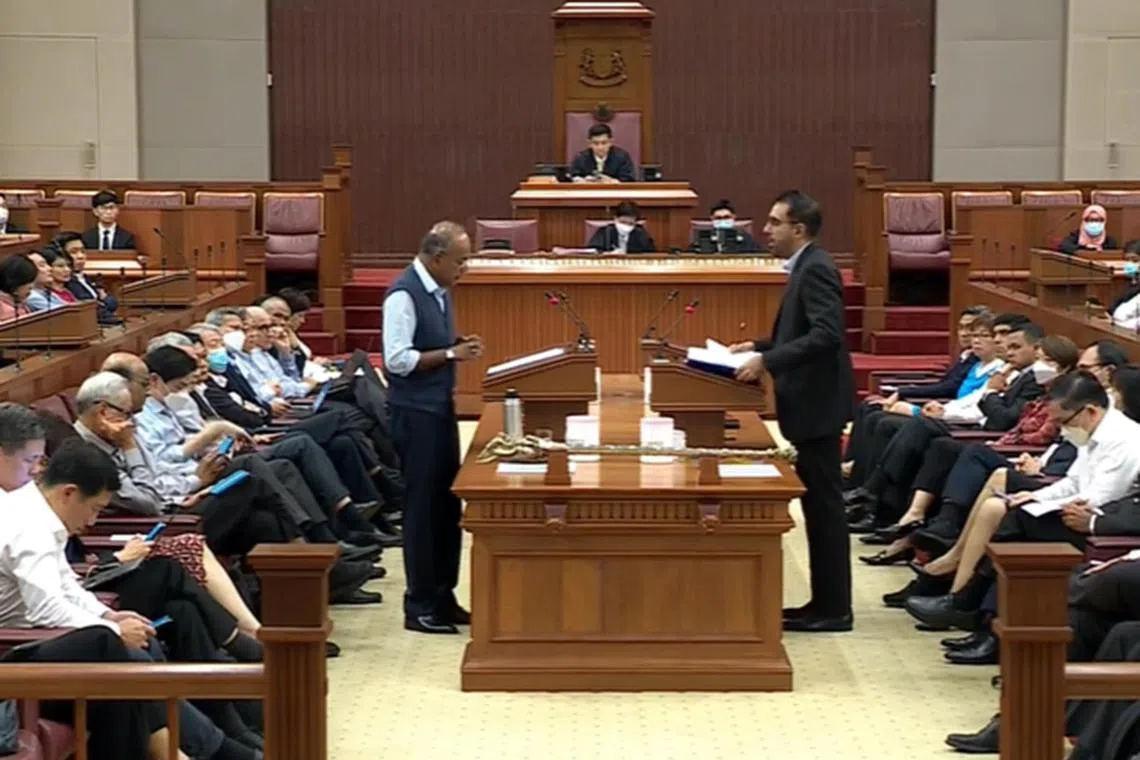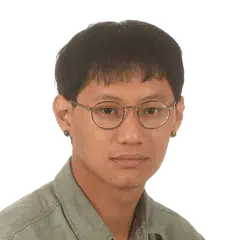Shanmugam says WP avoided taking stand on S377A to be ‘all things to all men’, Pritam disagrees
Sign up now: Get ST's newsletters delivered to your inbox

Law and Home Affairs Minister K. Shanmugam (left) and Leader of the Opposition Pritam Singh during the debate in Parliament, on Nov 29, 2022.
PHOTO: MCI
SINGAPORE - The Workers’ Party (WP) did not want to take a stand on the law criminalising gay sex and the constitutional amendment to strengthen marriage, to avoid being seen as supporting or opposing the repeal, said Home Affairs and Law Minister K. Shanmugam.
In doing so, it hopes to be “all things to all men, and not too much of anything to anyone”, and is supporting all sides without having to make a decision and being held responsible for it, he said.
Referring to how the WP decided to allow its members to vote on the repeal of Section 377A of the Penal Code according to their personal beliefs by lifting the party Whip, Mr Shanmugam said the WP hence had no official position on the matter
“They debated and discussed, but didn’t decide on a party position,” he said. “If this is how one decides, how will such a team function if they are in charge?”
In response, Leader of the Opposition Pritam Singh disagreed, saying the party’s stand has been established via majority over the two days of debate through the positions taken by his MPs.
Eight WP MPs spoke on the repeal and a constitutional amendment intended to ensure the definition of marriage can be changed only by Parliament and not the courts. Mr Singh said Mr Faisal Manap (Aljunied GRC), who missed the debate as he had Covid-19, was against the repeal.
Six supported repealing S377A, while three were against it, he said. For the constitutional amendment, seven supported it while two said they would abstain.
Mr Shanmugam had said in his speech closing the two-day debate that the WP lifting the Whip was not true democracy.
“Mr Singh said his lifting the Whip on WP MPs was democratic, so as to allow for a full and honest representation of all views,” he said. “That explanation is factually untrue. Every MP must know that. It does no credit to this House to say these things.”
The People’s Action Party’s (PAP) decision to not lift the Whip
“MPs are always entitled to state their honest views. They can agree, they can disagree. They can say what they think. You can express your views, whatever they are, without having to lift the Whip,” he said.
Mr Shanmugam added that MPs have always been free to express what they and their constituents think and that the Whip is relevant for voting, not speaking, as the Whip sets out the party’s position.
He likened the issue of what to do with S377A to an oncoming train, given the significant risk that the law would be struck down by the courts. The WP understood this risk, and the further risk that the definition of marriage could be challenged as well, he added.
“The question is whether we have the courage to act, or rather dive for cover to protect yourself and leave society to face the train wreck?” he said.
“What does the WP as a party propose, if you don’t want to repeal S377A, and also do not want to support strengthening marriage, which we have proposed?”
In response, Mr Singh said Mr Shanmugam had misrepresented his earlier statement, adding that what he had said was specific to the party’s position in 2019, which at the time was varied and divided with no consensus on whether S377A should be repealed.
He said he lifted the Whip in this debate so as not to fetter the voting rights of MPs.
“All the Workers’ Party MPs... put their personal positions on the record, and, in my view, they behaved like a loyal opposition; not loyal to the PAP but loyal to Singaporeans, knowing the position of Singaporeans outside of this House,” he said.
Mr Singh also asked the minister for clarity on how the PAP decides to lift its party Whip – citing how it did so in 1969 for the Abortion Bill and again in 2009 for the Human Organ Transplant Act.
Mr Singh said of the Abortion Bill: “Mr Lee Kuan Yew himself rose to deliver a speech, but was absent when it came to voting. If I follow the minister’s reasoning, would it be correct to say Mr Lee Kuan Yew was abdicating his responsibilities?”
In response, Mr Shanmugam said the situations are not comparable. He added that abortion was quite different as it was, at the time, a matter of individual conscience.
He said: ”I wasn’t in the House at that point in time, and I don’t think we should draw conclusions from the fact that one or another member was present or was not present. But I would be careful if I were Mr Singh to bring Mr Lee Kuan Yew into this and suggest that he somehow acted dishonourably.”
Mr Singh countered he never used those words.
On S377A, Mr Shanmugam said lifting the Whip is not acceptable for the PAP because societal interests are at stake.
The minister said “the very institution of marriage, and all your housing policies, and your education policies, and your rules on the structure and basic content of society can change overnight, and where societies get rent asunder by cultural wars, those are the risks we are talking about”.
Mr Singh also asked for the PAP’s position on having a lesbian, gay, bisexual or transgender candidate standing in general elections, referencing statements made by the PAP regarding Dr Vincent Wijeysingha – an openly gay man who stood in the 2011 General Election.
He said the “sexual orientation of an opposition candidate came into the spotlight with the PAP asking the Singapore Democratic Party to ‘come out of the closet’”.
In response, Mr Shanmugam said Mr Singh was trying to “move the goalposts” and start an entirely new debate about who can and who will stand for elections.
“I’m not the Prime Minister or the secretary-general of the party, but my personal view is that anyone who is not a criminal, and who is of good character, and of sound mind, and who can work for the residents ought to be able to stand for elections,” he added.
“In all of this, in a democracy, it also depends on how people are perceived and accepted in society. All of these are relevant considerations. One has got to look at individual candidates.”
Mr Shanmugam also addressed other concerns raised during the debate, which saw 38 MPs weighing in.
On the issue of cancel culture
Responding to Mr Louis Ng (Nee Soon GRC) on people with convictions under S377A, Mr Shanmugam said there are some such cases, most of which involved non-consenting victims, acts against minors or sexual acts committed in public.
He added that the Government is considering how to proactively reclassify the criminal records of a small number of individuals who were convicted between 1988 and 2007, for consensual, private gay sex between adults, as “spent” – referring to records which are no longer active but not entirely removed.
On concerns about the constitutional amendment raised by Ms Sylvia Lim (Aljunied GRC) and Ms He Ting Ru (Sengkang GRC), Mr Shanmugam said that the amendment represents a choice on whether to have the certainty that Parliament, and not the courts, will decide on issues of marriage.
“Parliament and the elected government should deal with these questions, and try and strike the right balance on these complex and delicate social issues,” he said.
Closing his speech, he said: “This Government has consulted widely, and has come to a position. We believe that our policy offers a way forward. It balances the different views, maintains our social cohesion, keeps us together.”


